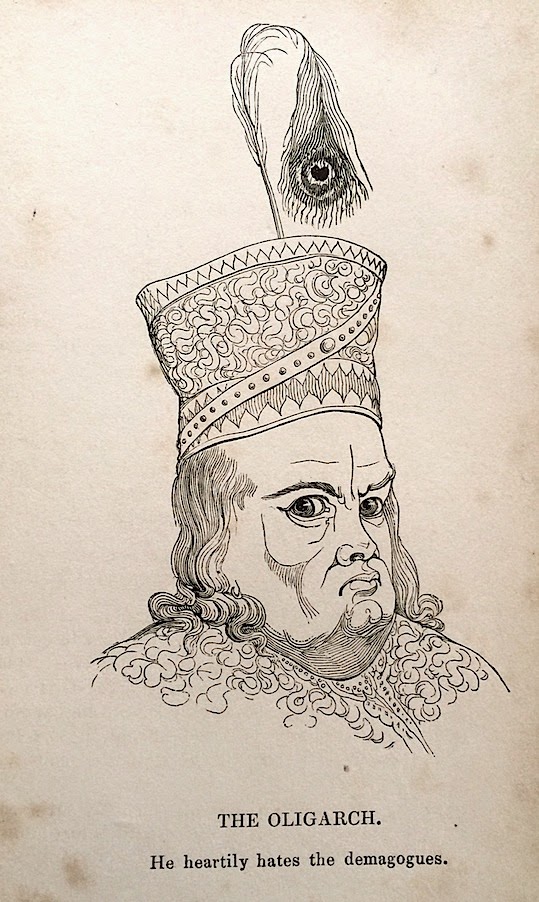
Found in a small book from 1831 this analysis of 'The Oligarch.' The word has now come to signify 'Russian billionaire' but there are (and were) other resonances. The Characters of Theophrastus Illustrated by Physiognomical Sketches to Which Are Subjoined Hints on the Individual Varieties of Human Nature (A J Valpy, London, 1831.) The ancient Greek classic of psychology and character study, updated to incorporate the findings of modern science, (including the new science of phrenology, although it is not named as such.) The plates are in the vein of Hogarth, Hieronymus Bosch, and the grotesque drawings in the Notebooks of da Vinci.
THE OLIGARCH: OR, THE ADVOCATE OF DESPOTISM
An arrogant desire to dominate over his fellows, appears in the opinions, the conduct, and the manners of this partisan of despotism. When the people are about to elect colleagues to the Archons for the direction of some public solemnity, he stands up to maintain that the magistracy should on no occasion be shared. And when others are voting for ten, his voice is heard exclaiming 'One is enough.' Of all Homer's verses, he seems to have learned only this:
"…think not here allow'd/ That worst of tyrants, an usurping crowd.
He is often heard using expressions of this sort: 'It is advisable that we should withdraw to consult upon this business. Let us separate ourselves from the mob, and from these popular meetings. This access of the populace to the magistracy should be barred.' If he meets with any personal affront, he exclaims 'That they and I should live within the same walls is insufferable.'
At noon he stalks abroad, sprucely dressed and trimmed, and he drives the world before him with haughty defiances, as if he could not think the city habitable until the mass of the people should be expelled from it. He loudly complains of the outrages sustained by the higher classes from the crowd of litigants in the courts of justice;and he tells of his having been put to confusion in the assembly of the people, by the contact of a squalid, shabby fellow, who placed himself beside him. He inveighs against the popular leaders; whom he professes to hate heartily: 'It was Theseus', he adds, 'who was the author of all these evils in the State.' Such is the discourse which he holds with foreigners, and with the few citizens whose temper is like his own.
